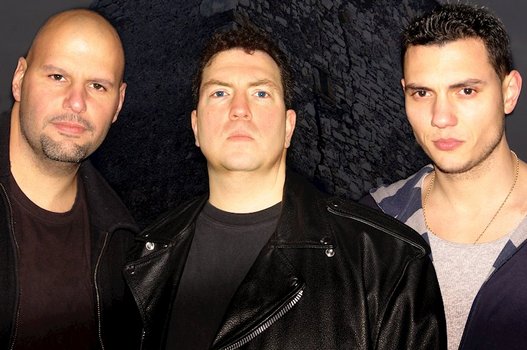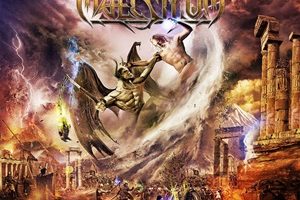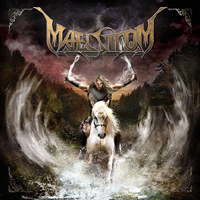Maelstrom – Destiny Unleashed
Thursday, 6th August 2020
Originally developing from Long Island as an underground sensation in the late 80’s, Maelstrom released two demos that gained major critical acclaim including high praise from vital UK metal magazine Metal Forces. Unfortunately, it was a case of bad timing for the band, as grunge soon overtook the scene and washed this power, progressive thrash act away. Filling that yearning to unleash what could have been, their first full-length Of Gods and Men comes out in 2020 – a three-part, 69-minute journey into a metal landscape rarely heard in the scene. Everything from Coroner/Kreator to neoclassical flourishes and even Amorphis-like atmosphere appears throughout these tracks – something rarely heard from a US band these days.
We reached out to vocalist Gary Vosganian who was very happy to bring me up to date on why now is the right time to finally release this debut full-length, the two years of vocal lessons he took and the reasons behind expanding his range and delivery, plus thoughts on social media/internet versus the previous underground era, and what the future holds.
Dead Rhetoric: Three decades after the initial Maelstrom demise, we have Of Gods and Men, the debut full-length for Maelstrom. What sparked the revitalization of the band and the desire to finally put out this material in 2020, did you believe that the climate would be more accepting of your style than in the mid 1990’s?
Gary Vosganian: Back in 1993-94 when we broke up, Joey (Lodespoto) and I finished Maelstrom thinking that it dissolved into something that wasn’t really finished. We stayed friends all along and Joey with other guys started another band which was a like Mr. Bungle style band. Jump forward several years later with the internet becoming much more popular, I ended up typing in the band name and the old demos. I came across a review online, and it spoke to Joey and I by a guy name Roman who had a website in German named Forgotten Steel. It was an online review of our second demo tape (This Battle to Make History, Yet History Never Comes), and he considered it one of the greatest demos he had ever heard and he couldn’t believe that we had not put out a full-length recording.
The review spoke to Joey and I – that was what sparked it all. We had something here that we had never finished and we would like to get done. That is what sparked it to get things going on again.
Dead Rhetoric: You mention cinematic pageantry when it comes to this three-part, 69-minute effort. Can you discuss the songwriting and recording process – and what challenges, obstacles, or surprises that took place as this record evolved until its completion?
Vosganian: A huge crux of this material was rooted in the material that we had done between our first demo and our second demo between 1989-1991. Of Gods of Men is the culmination of what we wanted to do with Maelstrom from the late 80’s. A lot of the material, although retooled or reformed, the roots are in the original songs. You can hear a lot of that in the original demos. Some songs are closer to what they are originally now, some songs got a huge rewrite. As far as the songwriting itself, we took what we considered the material that we liked back from the early demo days and revamped it, gave it a little more… anything that was heavy, we tried to make it heavier, anything that was fast, we tried to make faster, more is more sort of things. If it was epic make it more epic, if it was glorious, make it more glorious. Put it on to steroids from back then.
We wanted to take the original concept, the lyrical concept and musical concept. Everything we do, from the lyrics to the story and the music, it has a very cinematic feel to it. One drives the other. The idea is not just feeling what I’m saying, speaking, and singing, but how the music works with it. If it’s a march towards war you can hear the march. If it’s a funeral pyre, you are going to hear some music that makes you feel that way. A lot of the songs that are considered new now, are rooted in stuff we did a few years ago. The song “Army from Ash” replaces the song “Bloody Remains” from the first demo, but structurally is very much the same song. The verse is similar in how it drives and the way it was written.
Obstacle-wise – that’s why it took… we started this recording drums back when my son was born in 2005. We had about 15 years worth of obstacles to get this done. The biggest main hurdle that happened was Joey – we went down to Tampa to record the drums, and on the second day Joey got accepted to medical school. When you get that call, you get basically three weeks to pack up your life and go. He had every intention of recording the album at that time, so we had to turn around and figure out what the hell we were going to do. Joey was going to be gone for the next four to five years. That was one major obstacle. We had a couple of members pass away. I lost jobs, Hurricane Sandy wiped out my house.
Surprise wise while we were recording. A few things that made it to the album should not have made it to the album if not for a happy accident. The biggest one is “Lament of the Fallen”, being one of my favorites on the album. It was supposed to be an intro and a five to six-minute guitar solo type of thing. Joey recorded the solo years ago, so we were going to scrap the song. One day in the studio I asked the guy doing the recording to make me a loop of that track, and I sat there and wrote some lyrics. I threw it down, I got my wife in there to do some female vocals, I rewrote some vocals to work within the storyline and Joey loved it. He added some new guitar work onto it, it became this piece that never, ever intended to be what it ended up being.
Dead Rhetoric: Do you believe social media and the internet has been a game changer for independent bands to elevate their product and bands to new levels that weren’t achievable during the first run for Maelstrom? And how have you adapted to these changes?
Vosganian: I think in a lot of ways its been a big detriment. There are aspects that I use and I love. I believe the internet although it levelled the playing field, it’s wide and deep. There are things that are creating a wash of mediocrity because of it in my opinion. Doing something on a higher level and a bigger level is much more achievable with less resources and less creativity. It used to be if you didn’t have the resources to do something, you just had to get creative about it. Now you don’t need either. I am not a big fan of Apple iTunes, Google Play, and Spotify or any of the streaming sources. They have been horrendous to the music industry and to unsigned, underground music as well. It has done nothing positive. Our name is known, but our name was also known during the tape trading days too. I don’t think it’s helped at all. We have 138,000 people on our Facebook page, and that sounds impressive, but it doesn’t help and make much stand out. I’m more impressed that we are charting on the radio charts, I’m proud and that’s a much bigger deal.
Dead Rhetoric: What are your thoughts on heavy metal as a genre, have your views changed from the 80’s/90’s to the current scene? You had a great scene on Long Island with a lot of strong bands like Suffocation, Apparition, Coldsteel, Kronin, and yourselves among others…
Vosganian: I think locally, I don’t think there’s all that much of a scene left unfortunately. Brooklyn has formulated their own scene, and Maelstrom is not much of a live band anymore. I go to see friends’ bands as often as I can, but not nearly as often as it used to be. I don’t think there’s a huge local metal scene that’s anything close to what we had in the late 80’s, by any stretch of the imagination. At the same time, I think in a lot of ways I think metal has become much more well accepted. The same kids that are listening to one genre of music are listening to another genre. In the 80’s if you were listening to Depeche Mode, you probably were not also listening to Celtic Frost.
I think metal back in the 80’s was a musical taste and a personal preference. And I think that’s shifted, and that’s cool. I think certain bands can still draw. A couple of years ago I was at a Demolition Hammer show at Saint Vitus, it was packed and brutal. A great show. On a bigger level, King Diamond, Kreator, Amon Amarth are able to pack out the bigger clubs within New York City, which I think is great. It’s very hard to get kids in a room.
Dead Rhetoric: It has seemed like the live market is changing a bit. People that are older love the live shows, but the younger generation has so many more options of entertainment that it seems like it’s tougher to convince them always to go out to see bands play live…
Vosganian: I absolutely agree. In a lot of respects like that, you are right. I don’t think it’s a huge form of entertainment that (younger people) even consider. I don’t know where the mindset of that market is, the teenagers to the 28-29 year old people as far as live performance and live shows. I’m not going to pretend to know where that is at. For us, it’s not a tremendous concern. Because of Joey and his health concerns, we are not looking to make Maelstrom a live event again. If we were… I would be looking at more specialty style shows rather than any level of touring. Maybe if we can piggyback on a couple of shows, I’d love to do a 70,000 Tons of Metal thing, or a couple of European festival shows that we would be a good fit for. I’m not looking to do an East Coast tour grinding it out in a van on a Tuesday for eight people and a sound guy at 49 years old.
Dead Rhetoric: In preparation for this record you spent two years taking vocal lessons. What motivated this and how do you believe this shaped the record in a little bit of a different way?
Vosganian: Awesome question! Joey is a master of melody. And I was always a very gruff, forced singer. Very commanding in presence but I didn’t necessarily have a lot of melody behind what I was doing. During the EP recording, there were two quick passages during “A Futile Crusade” and they were more melodic. He loved those two passages, but cued him into believing into something that Gary can do. Joey leaves the lyrics and vocals up to me, I leave the music up to Joey. We both have input in everything. I could add it to my vocal attack and vocal ability, and it was one thing I was missing that we never really had. Using vocal melodies to create some counterpoints within the songs. I was more of a classic thrash singer, an amalgam of Mille from Kreator and Martin of Sabbat. I admired singers like John Wetton, Bruce Dickinson, the theatrical parts as well as the actual vocals.
Joey had a music school at the time – he worked something out that all I had to do was pay what they pay to the vocal coach and try to do lessons once or twice a week. So I got the training, two years worth of time, it put a new spin and record in my arsenal. I still love to cut loose and attack with that ripping Mille-esque style, but to do that and sing clean and sing heavy, but on pitch and create a unique thing for us.
One of the other things that how it started. When the EP came out, there was a great reviewer Ray Van Horn of Blabbermouth. At the time he was reviewing for Amp magazine, he wrote a review of us and he was having a difficult time placing where we were and who we were. He thought I was bizarre, my delivery and vocals. He told me I was sort of a Cronos from Venom trying to sing opera. That hurt, because the review before came from Martin Popoff and he loved my voice. And now I have Ray ripping me. A lot of times when there is a review, if a person is being an honest reviewer and critic, they may say something harsh but they do it because that’s what they do, they are being honest of their own art. There’s a lot to be gained by that. I love positive reviews, we like praise better than being kicked in the balls. But you look at it, sit on it and think about it. I reached out to Ray after that, although it hurt it prompted me to expand my art and get better at that. We became friends – and that was a big part as a team to improve my voice.
Dead Rhetoric: What’s next on the agenda for Maelstrom as far as promotion, recordings, live shows, etc. – or are there other projects/bands the individuals are involved in that you would like to talk about?
Vosganian: The reality is this album is 32 years in the making, and now it’s been out for a month or so on the market. We are still very much in this album mode, we are just pressing shirts now, doing CD’s, digipacks, the hard copy material. As well as the radio promotion, the PR is happening now. We haven’t really thought a tremendous amount about the short term or long-term future. What we would probably do is an EP of three songs, probably covers. And two of them would be left of center covers, not necessarily metal. Sort of what Disturbed did with “The Sound of Silence”. Many years ago we used to do a live version of a Billy Joel song, “Pressure”, we would love to do a recording of that. We have other ideas of covers to throw about. I’m not going to say we are necessarily going to do that – I’m very happy to let these tracks be out in the world for a while.
One thing we are doing which I am proud of is we have each song that has its own piece of artwork that drives that song for the concept. We are doing a book with a hardcover, each page will feature the art, the opposite side will be the lyrics. It’ll be a collector’s edition. It will be different and special, and not just a digital download.
























